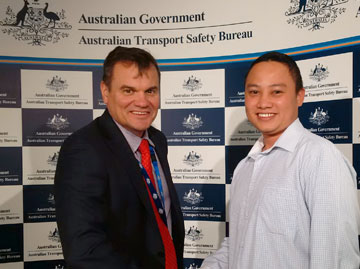Indonesian safety investigator Apib Prayogi can trace his journey to working at the Australian Transport Safety Bureau in Canberra to two tragic aviation accidents.

The first was the loss of Air France Flight 4590 from Paris to New York on 25 July 2000. All 100 passengers and nine crew members aboard the Concorde died when it crashed into a hotel on take-off. On the ground, four people were killed and one was critically injured. It was the only fatal Concorde accident during its 27-year operational history.
A few years later in junior high school, Apib was fascinated by a Discovery Channel documentary on the accident and, more importantly, the investigation that followed.
“I was very curious as to how the investigators did their detective work to uncover the cause of the crash,” Apib said.
It struck a chord in the mind of the young Apib such that when career consultants paid a visit in senior high school, aeronautical engineering was presented as an option that could lead to interesting work.
With (very) solid maths results at school, Apib completed a Bachelor of Aeronautical Engineering (2010) in Adisutjipto College of Technology, Jogjakarta, and then a Master of Aeronautical Engineering (2014) from the prestigious Institute of Technology, Bandung.
This led to Apib becoming a junior investigator with Indonesia’s National Transportation Safety Committee (NTSC).
The second accident was in March 2007 when a Garuda Indonesia Boeing 737 over-ran the runway while attempting to land at Yogyakarta airport in central Java. The accident claimed 21 lives, five of whom were Australian. The accident lead to the development of the Australian government Indonesia Transport Safety Assistance Package (ITSAP).
ATSB Manager International Richard Batt says the main elements of the ATSB's contribution to ITSAP is to deliver training and support for investigators from the NTSC.
“This includes the ATSB providing staff dedicated to various capacity building projects, funding ATSB training courses in Indonesia and Australia, and opportunities for aviation, marine, and rail investigators to work with their ATSB counterparts for extended periods,” Richard said.
“Our Indonesian colleagues learn much from us. But it’s not all one way. The programs that we develop are mutually beneficial. Cooperation between the ATSB and the NTSC is a key element in ensuring lasting transportation safety for the people of Indonesia and Australian travellers to Indonesia.”
Apib, 28, was selected as the first of two junior investigators who will spend time at the ATSB in Australia this year, thanks largely to his English language skills.
“I started learning English in junior high, where it is compulsory,” Apib said. “I continued into senior high and when I did my tertiary studies, most of the aeronautical engineering texts were in English.”
Apib is delighted with his time at ATSB, working with professional and highly committed staff and expanding his knowledge and experience.
“It’s like on-the-job training, especially with the short level (Level 5) investigations. We don’t have the kind of system and databases that you have here,” he said.
“I am learning how ATSB does its investigations, especially with its more advanced tools and laboratory. I already have a better understanding of how an investigation goes. And from that I can see how we can improve in Indonesia.
“We would like to have a system, such as you have at ATSB, which meets international standards. We will get there, but in my view it may take up to 10 years.”
Perhaps not surprisingly, Apib sees himself as a senior aviation investigator ‘in about 10 years’.
Married with a young daughter, Apib will continue to gain more qualifications, expand his knowledge and undertake more training.
In the meantime, he is grateful for the opportunity to work in Canberra at the ATSB, even if it is the middle of winter.
“I would like to thank Australia, the ATSB and the ITSAP program for this opportunity, and for assisting to improve our investigator qualifications and set up our flight recorder laboratory,” Apib said.
“I especially would like to thank Dr Soerjanto (NTSC Chairman) and Dr Richard Batt and the team in Level 5 investigations at ATSB. Everyone has been helpful and supportive and given me the opportunity to learn.”
Apib said he was also grateful to those who took him “out bush” for a first-hand encounter with kangaroos, koalas and a platypus!


